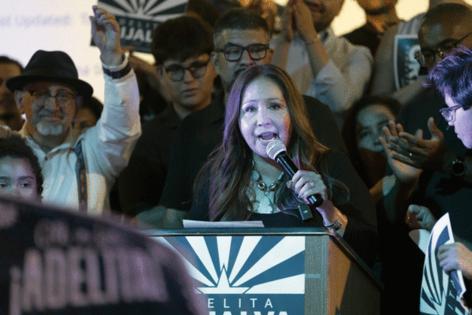Adelita Grijalva lawsuit unlikely to lead to swearing in, experts say
Published in Political News
WASHINGTON — Rep.-elect Adelita Grijalva faces an uphill battle in her lawsuit to allow someone other than Speaker Mike Johnson administer her oath to be Arizona’s 7th District representative, experts said.
Grijalva and the state filed the lawsuit in federal court in Washington earlier this week, arguing that Johnson has “unlawfully interfered” with her ability to serve in the House after refusing to swear her in for nearly a month after winning a special election in September.
But federal courts don’t typically weigh in on these sorts of disputes, experts said, and the speaker has wide latitude in how he runs the chamber under House rules.
Derek Muller, a law professor at Notre Dame Law School who focuses on election law, called the case a “surefire loser” where the courts were unlikely to decide to step in to help.
“She won her election, and she ought to be sworn in. That is a separate question from whether a court can step in and force the issue,” Muller said.
Sarah Binder, a political science professor at George Washington University, said that it would take months longer than the current political stalemate to even get a ruling from a court.
It is “difficult to get around the enormous power wielded by the speaker” in running the House floor, especially when the chamber is out of session, Binder said.
As of Friday afternoon, Grijalva and Arizona had not filed any requests for a speedy resolution.
Grijalva filed the lawsuit Tuesday after waiting nearly a month since winning a special election on Sept. 23 to serve out the remainder of her father’s term. She won with nearly 70% of the vote and she and Arizona Attorney General Kris Mayes argued that her constituents were being deprived of their representation.
While federal law states that the speaker administers the oath of office to House members, the lawsuit contends that power does not allow Johnson to delay a member from taking office when there is no dispute about their election or qualifications.
The lawsuit sought to have the court declare that Grijlava’s oath of office can be administered by “any person authorized by law to administer oaths under the law of the United States, the District of Columbia, or the State of Arizona.”
But that would require a court to dive into the power of the speaker over how the House handles elections, which Muller and other experts said was unlikely.
Muller said the fate of Grijalva’s case likely would be determined by a 1986 decision by the U.S. Court of Appeals for the District of Columbia Circuit, which denied a lawsuit by frustrated voters who sought to have their preferred candidate seated in Congress after a close election.
Then-Judge Antonin Scalia, who later became a Supreme Court justice, pointed out that the Constitution made Congress the ultimate judge of elections, and he would not override the vote of the House to seat Democrat Frank McCloskey instead of Republican Richard McIntyre.
“The exclusion of others — and in particular of others who are judges — could not be more evident,” the decision said.
The Supreme Court did weigh in on one dispute, siding in 1969 with Adam Clayton Powell Jr. of New York after he won reelection but the House voted to not seat him. But that decision came only after the House took an affirmative step to bar Powell, not just leave him in limbo, Muller said.
Muller said “even that was controversial,” and the Supreme Court relied on the fact that the House admitted it was excluding Powell for reasons outside those laid out in the Constitution.
Grijalva is effectively asking the courts to delve further into how the speaker decides to run the House chamber, Muller said.
“The courts give leeway to the House to decide these matters of timing. Courts have never sort of intervened in that before. They’re going to leave this to the political branches, to the political process, to resolve this,” Muller said.
Muller also pointed out that the lack of an emergency filing, and numerous errors in the initial complaint, indicated that the case was a long shot.
Johnson has said that he intends to swear Grijalva in when the House returns to normal business after the federal government shutdown ends.
At several pro forma sessions since Grijalva won her election, Democrats have attempted to force the issue by seeking to be recognized by the presiding chair of the chamber, but they have been ignored each time.
Binder said that returning to normal business would coincide with more Democratic procedural power to complain about Johnson’s treatment of Grijalva. Binder said there’s not much leverage Democrats have before then, beyond potentially symbolic efforts like Grijalva’s suit.
“Absent a majority in that chamber willing to tell the speaker otherwise, what is the incentive to tell the speaker to back down?” Binder said.
She added that Johnson’s treatment of Grijalva was a bad precedent for the chamber.
“Unless the members are going to insist on equitable treatment across all members-elect that puts the House and every member in potential jeopardy down the line,” Binder said.
The case is State of Arizona and Adelita Grijalva v. United States House of Representatives.
©2025 CQ-Roll Call, Inc., All Rights Reserved. Visit cqrollcall.com. Distributed by Tribune Content Agency, LLC.
























































Comments